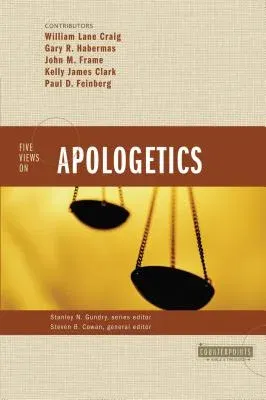Zondervan
(Author)Five Views on ApologeticsPaperback, 7 February 2000

Qty
1
Turbo
Ships in 2 - 3 days
Only 1 left
Free Delivery
Cash on Delivery
15 Days
Free Returns
Secure Checkout

Part of Series
Counterpoints: Bible and Theology
Part of Series
Counterpoints
Print Length
400 pages
Language
English
Publisher
Zondervan Academic
Date Published
7 Feb 2000
ISBN-10
0310224764
ISBN-13
9780310224761
Description
Product Details
Author:
Book Format:
Paperback
Country of Origin:
US
Date Published:
7 February 2000
Dimensions:
20.4 x
13.39 x
2.67 cm
ISBN-10:
0310224764
ISBN-13:
9780310224761
Language:
English
Location:
Grand Rapids
Pages:
400
Publisher:
Weight:
331.12 gm